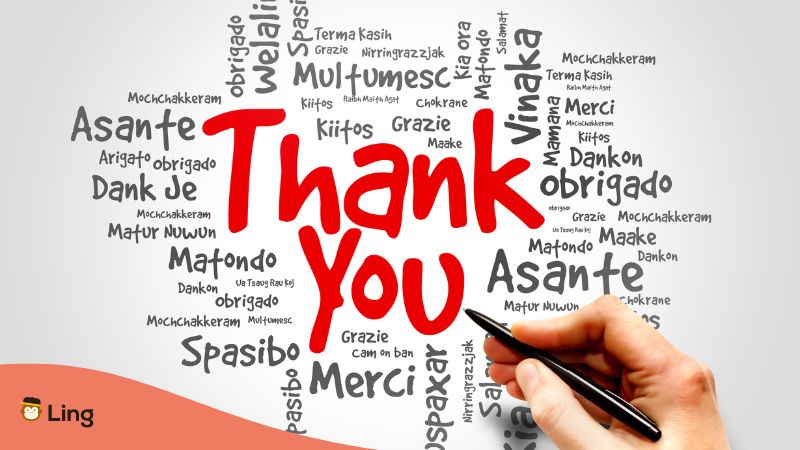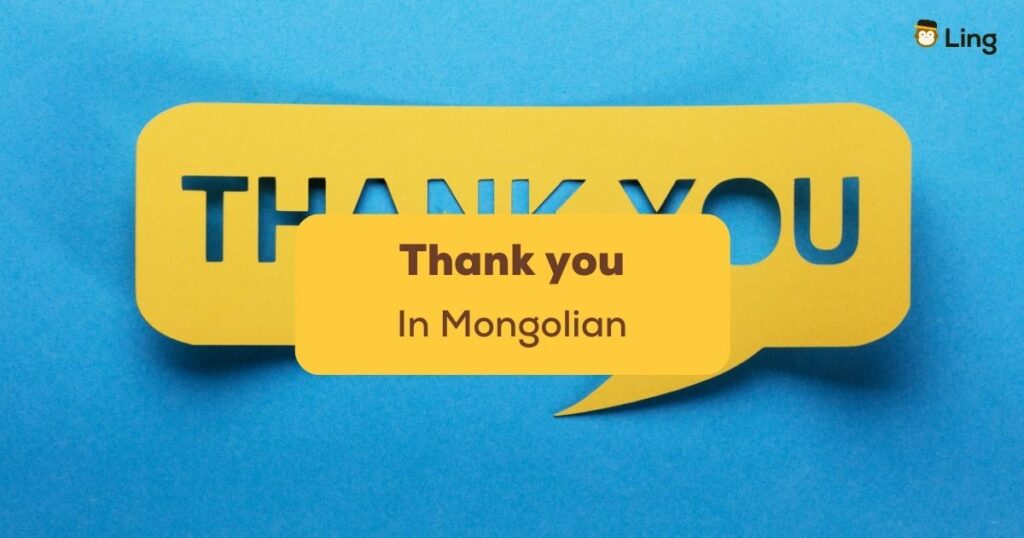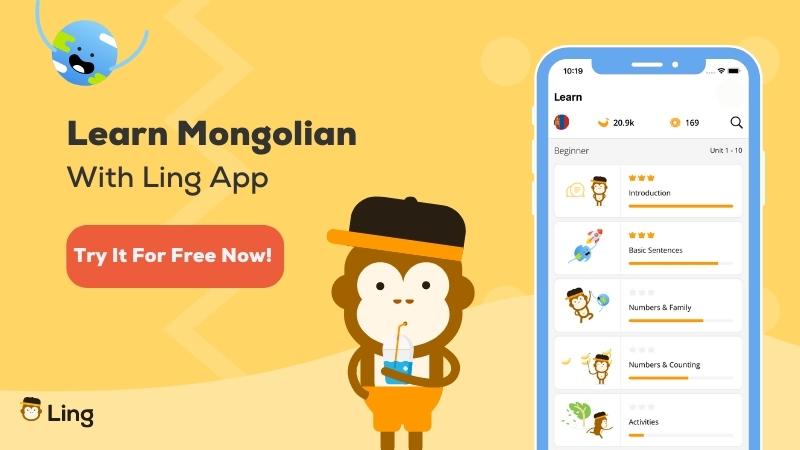Every time I travel to a new country, thank you is always the first thing I learn. It’s like the secret code to unlock a culture, the key to winning locals over, and frankly, it’s just a fast and easy word to learn. Plus, it’s one of the most used words by travelers, so you know you’ll be using it a lot. Mongolia is no exception!
But let’s be real, some languages can be trickier than others, especially when you’re not used to the sounds and pronunciations. That’s why I believe learning how to say thank you in the Mongolic language is a great way to start your journey into the language.
Mongolian is a beautiful and complex language, and it might take some time to master it. However, showing gratitude is a universal gesture, and Mongolians value it deeply. By learning how to say thank you in Mongolian, you’re already taking the first steps to connect with locals and show them that you respect their culture.
So, are you ready to learn the best ways to say thank you in Mongolian? Hold on to your hats, folks, because we’re about to embark on a wild ride of tricky pronunciations and beautiful expressions of gratitude.
But before we start, let me warn you there is much more to Mongolian than just thank you. I mean, have you seen their traditional dress? It’s like they took all the colors of the rainbow and made them even brighter. And don’t get me started on their cuisine. Trust me; you’re missing out if you haven’t tried buuz (Mongolian dumplings).
So, if you want to learn more about Mongolian culture, language, and lifestyle, be sure to check out our blog. But for now, let’s focus on the task at hand and learn the best ways to say thank you in Mongolian. Get ready to impress the locals and show off your language skills.

Thank You In Mongolian 101
Let’s get straight to the point and don’t waste too much of your time – to say thank you in Mongolian, you say Баярлалаа (Bayarlalaa). Sounds simple, right? This is a quick and informal way to say thank you in Mongolian. Use it when you get your food at a restaurant, if someone held the door for you, or simply if someone was nice and helped you get to your destination.
Informal Ways To Say Thank You In Mongolian
Informal situations are the perfect opportunity to improve your language skills and connect with locals on a personal level. You can try new words and don’t worry about saying them wrong or using a strange accent.
When it comes to saying thank you in Mongolian informally, there are a few expressions you can use to express your gratitude in a more casual way.
Remember, when using these expressions, make sure to say them with a smile and a genuine heart. Mongolians value sincerity and kindness above all else, so be sure to use these expressions in the right context and with the right tone.
And let’s be real, if you can master these informal expressions, you’ll be on your way to impressing the locals and making lifelong friends in no time. So go ahead and give them a try, and who knows, you might even get invited to a traditional Mongolian wrestling match or two.
Thank You Very Much – Маш их баярлалаа
First up, we have Маш их баярлалаа (Mash ikh bayarlalaa) which means “thank you very much”. This expression is perfect when you want to show extra appreciation and gratitude for something. For example, when a Mongolian friend treats you to a delicious bowl of khuushuur (a traditional Mongolian fried dumpling), you can say Маш их баярлалаа to show how much you enjoyed it.
I Am Grateful – би талархаж байна (Bi Talarkhaj Baina)
Next, we have би талархаж байна (bi talarkhaj baina), which means “I am grateful.” This expression is perfect when you want to express deep gratitude and appreciation for something. For example, when a Mongolian friend goes out of their way to show you around the city, you can say this to show how much you appreciate their kindness. It is a casual yet a bit more formal and intense gratitude expression.
I Appreciate It – Би үүнийг үнэлж байна (Bi üüniig ünelj Baina)
Last but not least, we have Би үүнийг үнэлж байна (Bi üüniig ünelj baina), which means “I appreciate it.” This expression is mostly used when someone does a good action towards you, and you want to show your appreciation for their actions. For example, when a Mongolian friend helps you with your Mongolian language studies, you can say Би үүнийг үнэлж байна (Bi üüniig ünelj baina) to show how much you appreciate their help.

Formal Ways To Say “Thank You” In Mongolian
On the other hand, sometimes you have to apply some level of formality to your speech. For example, if you’re talking to an older person, your boss, or even a stranger, you should use these formal ways to express gratitude.
In formal situations, it’s important to use the right level of politeness and respect to offend no one. Using these formal expressions will show that you are aware of Mongolian culture and customs and that you respect them. When in doubt, err on the side of formality.
So, here are a few ways you can express how grateful you are in more formal situations:
I Remain Obliged – Би үүрэг хүлээсэн хэвээр байна (Bi üüreg Khüleesen Kheveer Baina)
This expression is perfect for formal situations where you want to express a deeper level of gratitude and respect. For example, when a Mongolian colleague helps you with an important work project, you can say Би үүрэг хүлээсэн хэвээр байна (Bi üüreg khüleesen kheveer baina) to show how much you appreciate their assistance.
Gratitude – Талархал (Talarkhal)
This expression is also used in formal situations, and it means “gratitude” or “thanks.” It’s a simple and respectful way to express your appreciation for something. For example, this word is a good option when a Mongolian business partner helps you secure a deal; you can say Талархал (Talarkhal) to show your appreciation for their hard work.
Very Kind Of You – Чиний их хаан (Chinii Ikh Khaan)
This expression is perfect when you want to show appreciation for someone’s kindness and generosity. For example, when a Mongolian host goes out of their way to make sure you feel comfortable and welcome, you can say Чиний их хаан (Chinii ikh khaan) to show how much you appreciate their hospitality.
How To Say “You’re Welcome” In Mongolian
So, we’ve learned how to say thank you in Mongolian, but how do you respond if those words are aimed at you? Fear not, my friend, because I’m here to teach you how to say “you’re welcome” in Mongolian.
The phrase you’re looking for is зүгээрээ (zugeeree), which literally translates to “I’m fine.” It might sound a little too informal, but trust me, it’s a common and polite way to respond to someone’s thanks.
But if you want to add a little bit of humor to your response, you can also say асуудалгүй (asuudalgüi), which means “no problem” or “no big deal.” It’s a casual and friendly way to respond to someone’s thanks, and it might even get a laugh out of your Mongolian friends.
So the next time someone thanks you for something, remember to use one of these expressions, and you’ll be sure to make a great impression with your language skills and sense of humor.

Other Phrases To Express Gratitude
Here are a few more useful Mongolian phrases you can use to express gratitude in both traditional Mongolian script and its pronunciation:
| English | Mongolian | Pronunciation |
| Thank you for your kind words | Сайхан үг хэлсэнд баярлалаа | Saikhan üg khelsend bayarlalaa |
| That’s very kind of you | Энэ чамд маш эелдэг ханддаг | Ene chamd mash eyeldeg khanddag |
| I am grateful/thankful | Би талархаж байна/баярлалаа | Bi talarkhaj baina/bayarlalaa |
| How can I repay you? | Би чамд яаж эргүүлэн төлөх вэ? | Bi chamd yaaj ergüülen tölökh ve? |
| You’re the best | Чи хамгийн сайн нь | Chi khamgiin sain ni |
| What would I do without you? | Чамгүйгээр би яах байсан бэ? | Chamgüigeer bi yaakh baisan be? |
| It means a lot to me | Энэ нь надад маш их утгатай | Ene ni nadad mash ikh utgatai |
| You made my day | Чи миний өдрийг бүтээсэн | Chi minii ödriig büteesen |
| I have no words | хэлэх үг алга | Khelekh üg alga |
Learn More Mongolian With Ling App
Now that we’ve covered all the different ways to say thank you in Mongolian, I hope that you’re feeling inspired to learn even more about this fascinating language. I know I caught the learning bug when I first started studying Mongolian, and I haven’t looked back since.
But if you’re not sure where to start with your language-learning journey, I have the perfect solution for you. It’s called Ling App, and it’s an interactive, proven by native speakers, and fun app that can teach you over 60 languages, including Mongolian.
With Ling App, you can set your own pace, track your progress, and even have a conversation with our AI chatbot to practice your language skills in a safe and supportive environment. Plus, with Ling App’s engaging lessons, interactive games, and personalized feedback, you’ll be speaking Mongolian like a pro in no time.
And the best part? Ling App is completely free to download, so you can start learning Mongolian today without spending a dime. So what are you waiting for? Download Ling App now and join the millions of language learners around the world who are discovering the joys of learning a new language.
дараа уулзая (daraa uulzaya – see you next time!)





















